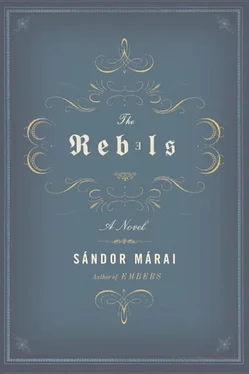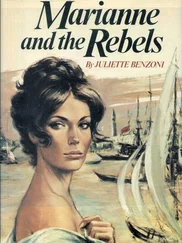He fell silent, nodded, and grasped the table with both hands. A thunderclap.
“That was a close one,” he said respectfully, but did not turn his face to the window.
“The gentlemen would do well to realize that things are never simple,” he said slowly, his voice loud now. “You never know what you will find the next morning. He no longer wants to wander around the town. The fury builds in him until he is like a walking bomb, an explosive device in his chest, and he is afraid, afraid of being alone with another man because he fears he might strangle him, fears he might be a danger to people, to the town generally; he feels such fury and power he thinks he could set the town on fire, to cover it in salt and plow it all up. The girl in Lemberg, he thinks, she told him. How could such a girl know something he himself didn’t know until fairly recently? Does someone like him bear a visible mark? Can others see it too? God, oh God. It’s impossible to live like this, he thinks. He walks the street with his eyes on the ground, he dare not look young girls in the face, no, not the young men either. He hates young gentlemen, the healthy vigorous ones who can go with girls. One day I shall have them in the palm of my hand, he thinks. He weeps like an old woman, blaming himself. One can live neither by the stomach nor by any other appetite, he thinks. The patriarchs were right to lay down the law, but you, you laughed at their laws. You were a lecher, a lush, a glutton, you wronged your friends and acquaintances, that is why God is punishing you. That’s how he talked to himself. Impossible to live like this, he thinks. The Lord rained fire on Sodom and Gomorrah, he burned both flesh and bone. We are all sinners, he thinks, and God has sent his rain of fire on me too for my sins.”
He raised the bottle, put it to his mouth, and drank as if choking, in loud gulps.
“One day he is sitting in the shop and a cripple comes in, a man with a great long false-looking beard. He wants to pawn a cuckoo clock with a chain. Rejected, he slowly hobbles to the door where he stops and says: We are all sinners. The very thing you said a moment ago, he thinks. He calls the other back. The man comes over to the counter and starts preaching. Only sinners may be cleansed, he says, and mutters something about the brazen serpent. He listens, a fool at last after all those clever people. Miss, he says, write down one cuckoo clock, but secretly he thinks, another thing connected with birds, a bad sign. The bearded man goes away but not before leaving his name and address and offering his friendship. When it comes to money he is not such a fool. Meanwhile the man goes on living but he can’t taste his food, his drink is bitter, sometimes he has trouble with his vision, and whenever he sees a woman he turns away and hangs his head. It is the hand of God that smites you, he thinks. One afternoon he picks up an old pair of shoes and thinks of the fool down fishmongers’ alley. He calls in. The man immediately rises from his three-legged stool and as soon as he sees him hobbles over and begins a rant about the exodus from Israel and about sitting by the fleshpots in the land of Egypt. How does this man know I am a lover of flesh? he wonders. The bearded man sits down on the stool, continues his oration, his speech somewhat confused but perfectly amusing. A little boy is sitting in the corner reading by candlelight, paying no attention to them; my son, says the bearded man, one day he will be one of the gentry, stand up, Ernõ, say hello to the gentleman.”
He leaned right over the table, his chin propped on his hands, his face glimmering close to the boys’ own faces. He was speaking more quietly now, in broken sentences, panting slightly. Ábel sat back, his hands grasping the legs of his chair, not moving a muscle.
“A very bright little boy,” said Havas almost whispering. “A scrawny little sparrow of a boy, but very bright. Next day he brought the shoes over. You could have the most remarkable conversations with him. He came often, always at the same time, after dinner, I could talk to him for hours. Oh, he was so bright, he knew everything. He listened very attentively when the talk turned to serious matters. He was an ideal listener for a serious person to talk to, to reveal his innermost thoughts and troubles to. He was a very poor boy but with a lively sense of ambition. He had plans. He wanted to travel abroad. It was a delight spending time with him. His clothes were so ragged that any sensitive man’s heart would have gone out to him. He wanted to be rich when he grew up, a scholar, a powerful man. He wanted to live in town, in the town where he had been poor, where he had had to carry books for his better-off classmates, to teach so he could eat and drink, to polish, on occasion, his classmates’ shoes. That was because his better-off friends often took pity on him and, wanting to help him and his family, sent their shoes to his father to be resoled. He had much to learn because his lot was harsh, because he could not afford to pay school fees, and because his very body was frail and awkward, like his father’s. You couldn’t even begin to compare him to his better-off classmates. He was vastly ambitious. There was a time when he would come every afternoon, dine here, not scorning the fleshpots served up by his lonely widower friend. He would take gifts home to his father, who would also call sometimes but never when the boy was here, and would bow and scrape and say: only sinners may be cleansed, and, I am most grateful to the noble gentleman for his kindness to my son. Meanwhile the little boy continues to call and there are many things a growing boy like him requires, clothes, books, underwear, because he is preparing to study abroad, and he has gone to the post office to open a savings account where he puts whatever money he occasionally earns. He talks about everything under the sun, particularly about his friends. He has three friends, he says, and a fourth one too who is not at school but hangs around with them.”
It seemed the thunder had stopped for a moment, that they were utterly frozen in the sudden silence, as if they had fainted away or simply couldn’t move. Then a single great gust of wind tore the window open, knocking things over, sweeping the rain in. The pawnbroker did not move so much as a muscle. It was as though he had lost the powers of both seeing and hearing.
“They have so much to talk about. One day he tells him what well-brought-up boys they are. Everything is different with them, even now when their fathers are away. The way they greet each other, the way they talk, it is all so different from the way we do such things. Because that is how intimate the talk is now. He talks about their games. They have decided to tell lies, he says. Then, another day, that now they are stealing. One day soon they’ll be coming over. The actor is a fascinating man. Even on the basis of such a brief acquaintance they can tell he’s a fellow spirit. There is something sorrowful about him. And when the actor calls in he tells me what interesting and well-brought-up boys he has befriended. Rebels, all of them, he says. They are in rebellion for some reason or other. One day young Ernõ fails to call. He is only to be seen together with the three other young gentlemen, something has happened to him, he is constantly tracking one of the other young gentlemen. One day the actor says: now’s the time, what if we arranged a little private performance with the boys? Absolutely private. You sit up there in one of the boxes and watch. No one will know. It will cost, of course. The actor offers to arrange it.”
He went over to the window and closed it. The water was lying in puddles on the floor.
“What a storm!” he said, shaking his head. He feared it might wash away whatever entertainment the young gentlemen had been planning for tonight.
Читать дальше












